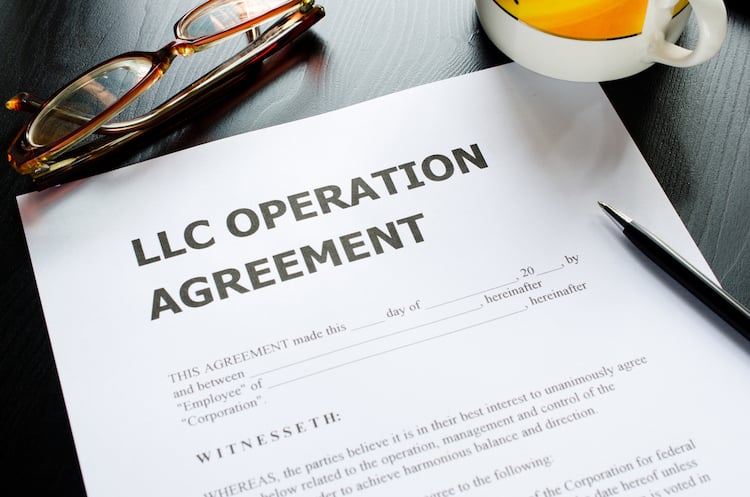For many real estate investors, forming an LLC for rental property offers the best of all worlds when it comes to protections, tax treatment, and raising investment capital. However, using an LLC for rental property may not be the right choice for every investor.
In this article, we’ll take a quick look at how an LLC works and discuss the pros and cons of forming an LLC for rental property.
Key takeaways
- An LLC for rental property can be a single-member LLC or have multiple members.
- Three advantages to using an LLC for rental property are pass-through of income and losses, protecting personal assets, and creating a flexible ownership structure.
- Drawbacks to using an LLC include possible self-employment tax, difficulty of financing, and annual fees.
What is an LLC for a rental property?
Also known as a limited liability company, an LLC is a business structure that real estate investors often form to hold rental property.
Each shareholder of an LLC is known as a member. Depending on the objectives of an investor and the LLC’s operating agreement, an LLC can have a single-member or multiple members.
The IRS considers an LLC to be a “pass-through entity” for tax purposes. Similar to a sole proprietorship, real estate partnership, or S corporation, profits or losses from an LLC are passed through to each member and reported on their personal tax returns.
Because an LLC is a pass-through entity, a limited liability company does not pay taxes directly like a corporation would, although some states may require an LLC to pay an annual renewal fee.
Generally, profits and losses are allocated to each member based on the percentage of ownership in the LLC. For example, if Beth holds 55 percent of the shares and Tom holds 45 percent, Beth receives 55 percent of the profits or losses, and Tom the rest.
However, members of an LLC can elect to make a “special allocation” that allows profits and losses (or other tax benefits such as depreciation) to be passed through to each member that is not based on percentage of ownership. So, even though Beth owns 55 percent of the LLC, the two members may mutually agree to split any profits 50-50.
20 pros and cons of an LLC for rental property
An LLC may provide investors with greater options for owning rental property than directly owning real estate under their individual names.
Let’s take a look at some of the common pros and cons of an LLC for rental property. But, keep in mind that what is advantageous to one investor may be a drawback for another. That’s why investors may choose to consult with a real estate attorney before creating an LLC to hold rental property.
Pros of an LLC for rental property
1. Protect personal assets
Holding a rental property under an LLC may help to protect the personal assets of an investor in the event of a lawsuit. Generally speaking, if an investor is sued (for example, by a tenant or supplier) only the business assets would be at risk.
2. Single or multiple members allowed
An LLC can have one member, or an unlimited number of members in a multi-member LLC. This allows an individual investor to benefit from the advantages and protections that an LLC may offer. However, if an LLC is treated as an S-Corporation for tax purposes, there is a 100 member limit.
3. LLC may have foreign members
Depending on the laws under which the LLC is formed, foreign members who are not U.S. citizens may be allowed. This can make it easier for an investor to raise capital outside of the country, and offers foreigners another way to invest in U.S. real estate.
4. Pass-through entity for tax purposes
An LLC is treated as a pass-through entity for tax purposes, which means that profits or losses flow through to each member of the LLC, usually based on the percentage of ownership. Members then report income or loss on their individual tax returns and pay taxes based on their personal income tax rate
5. Flexible pass-through structure
Although profits and losses from an LLC are generally passed-through to each member based on their percentage of ownership, members may agree in the operating agreement to a different allocation. For example, a member in an upper income tax bracket may ask for a larger percentage of the depreciation expense to allow for a bigger tax write-off.
6. Management flexibility
The operating agreement of an LLC may also be written to provide for management flexibility. For example, one member with property management experience may be appointed to handle the daily details of the property or the operating agreement may require that all members vote on major decisions, such as refinancing or selling the property.
7. One LLC for each rental property
Many real estate investors create an LLC for each rental property they own. This allows investors with multiple rental properties an additional layer of protection by insulating the potential claims against one property from the entire real estate portfolio.
8. Contribute personal assets
Members are permitted to contribute personal assets such as real property or funding to an LLC. An LLC may also pay reasonable interest to members for loans, until the money borrowed by an LLC is entirely repaid.
9. Easy to transfer LLC interests
Shares in an LLC may be able to be sold or transferred to new members, depending on the terms in the operating agreement. Real estate owned under an LLC can stay under the LLC, while under control of new members.
10. More professional and business-like
Owning rental property under the name of an LLC also gives a real estate investor a more professional business appearance, and potentially increased credibility with tenants, lenders, and vendors.
11. Forming an LLC is inexpensive and easy
An LLC can be relatively easy and inexpensive to form, depending on the state. According to the legal resource website Nolo.com, LLC formation costs range from as little as $40 in Kentucky to between $300 - $3,000 in Tennessee.
Some states also have a minimum annual LLC tax and require annual reporting fees, and LLCs may need to pay registered agent fees to an agent for service of process in the state the property is located in.
Cons of an LLC for rental property
12. LLCs are not lawsuit proof
Although one of the main reasons investors form an LLC for rental property is for additional protection, asset protection is not guaranteed. For example, if an LLC or a member is judged guilty of fraud or negligence in a lawsuit, the winning party may be able to “pierce the corporate veil" and hold the individual members liable for debts or damages.
13. LLC required for each state a property is in
An LLC is only good for the state the property is located in. Investors with a portfolio of rental properties located in multiple states must create an individual LLC for each property, as well as pay for establishing and maintaining the LLC.
14. Requires additional tax filings
Even though an LLC is treated by the IRS as a pass-through entity for tax purposes, an LLC is still required to file an annual tax return. An LLC files Form 1065 to report income or expenses passed through to each member, and also provides each member with a K-1 indicating the profit or loss distributed to each member for the tax year.
15. Annual filing fees normally required
Once an LLC is formed and registered, most states require an annual or bi-annual filing fee to keep the company active. States like Missouri and New Mexico have no annual ongoing LLC fees, while annual LLC fees in other states can run hundreds of dollars or more each year. Nolo.com maintains a chart of ongoing LLC fees for each state.
16. May require paying self-employment tax
Members of an LLC may be required to pay self-employment taxes for Social Security and Medicare on any income earned. However, LLC members may be able to avoid paying self-employment tax by setting the LLC up so that it is taxed as an S-Corp, according to UpCounsel.
In most cases, an LLC for rental property can be registered with the state as an LLC and registered with the IRS as an S corporation for tax purposes.
17. Due on sale clause may be triggered for transferred property
While members may transfer rental property into the LLC, one of the unintended consequences of doing so may be triggering the due on sale clause.
Most mortgage documents require the existing loan to be paid off if the property owner changes, even if the rental is transferred into a single-member LLC. Investors may wish to consult with their lender regarding the options for transferring a rental property into an LLC.
18. Potential for transfer tax liability
Some cities, counties, and states charge a transfer tax when real estate ownership changes. Also known as a deed tax or stamp tax, transfer taxes are usually equal to a percentage of the appraised value or property sale price.
19. Financing an LLC-owned property may also be difficult
While it may be possible for an LLC to obtain a rental property loan, most lenders will also ask for each member to personally guarantee the loan. That means if the LLC defaults on the loan, the lender is able to hold each member jointly and severally liable for any outstanding mortgage debt.
20. Member turnover may be difficult
Real estate investors forming a multi-member LLC may wish to address in the operating agreement how member turnover is handled. For example, if one member wishes to leave the LLC, is he or she allowed to sell the shares or required to sell the shares back to the LLC?










